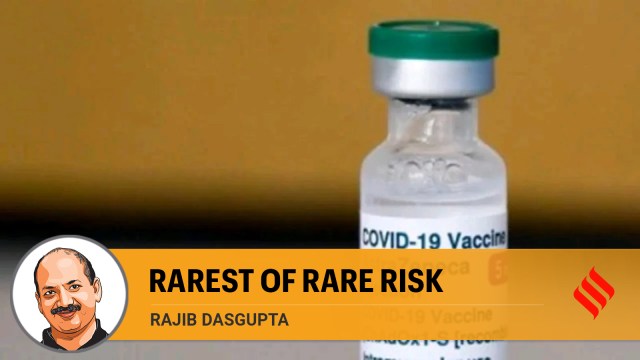- India
- International
Side effects of AstraZeneca vaccine: Medicine is clear now to the courts
Benefits of Covid vaccines far outweigh risks. Pandemic has created ethical dilemmas. The way court's resolve them could impact people's perception of vaccines
 With nearly 1.75 billion doses administered, the AstraZeneca was used to vaccinate about nearly 80 per cent of India’s vaccinated population. (File)
With nearly 1.75 billion doses administered, the AstraZeneca was used to vaccinate about nearly 80 per cent of India’s vaccinated population. (File)Like in most pandemics, the after-shocks of Covid-19 are continuing. The most recent being Oxford-AstraZeneca’s vaccine being linked to a rare adverse side effect — thrombosis with thrombocytopenia syndrome (TTS). This has been known for the past three years. What is new is the company, which is being sued in a class action in the United Kingdom had shifted from its earlier position — from, “we do not accept that TTS is caused by the vaccine at a generic level” in May 2023 to “it is admitted that the AZ vaccine can, in very rare cases, cause TTS” in February 2024.
Manufactured by the Serum Institute of India (SII) in India and sold under the brand name Covishield, this vaccine was the workhorse in India’s Covid-19 vaccination programme. With nearly 1.75 billion doses administered, it was used to vaccinate about nearly 80 per cent of India’s vaccinated population. But, now, as per reports, the parents of a young Indian woman, deceased after receiving the Covishield vaccine, plan to file a case against the SII.
Understanding the rare side-effect
What exactly is a TTS? Also, known as vaccine-induced prothrombotic immune thrombocytopenia (VIPIT) or vaccine-induced immune thrombotic thrombocytopenia (VITT), it is a rare syndrome reported in persons who received the adenoviral vector Covid-19 vaccines (there are several) and is generally understood to result from an immune response triggered by the adenovirus vector used in the vaccines. Typically presenting four to 42 days after vaccination, the symptoms are on account of thrombosis formation (blood clots) along with thrombocytopenia (low platelet count). It’s classified into two tiers. Tier 1 tends to be associated with younger age groups and is marked by more severe cases with a higher risk of morbidity and mortality. The hallmark of Tier 1 is the uncommon site of thrombosis such as brain or gut or other rare sites of venous and arterial thromboses.
But, didn’t this show up in the vaccine trials? In contrast to the traditional clinical trials that follow a straightforward and inflexible three-step approach, Covid-19 vaccines took an expedited development route guided by the “adaptive and seamless” design advocated by the WHO for public health emergencies. Further, clinical trials are not adequately powered (statistically meaning, the probability of making a correct decision) for very rare events such as this.
Is TTS a threat?
How rare is it and how fatal is it? TTS reporting rates (cases per million doses administered per 21 days) have ranged from a high of 17.6 in Nordic countries to a low of 0.2 in some of the Asian countries and Brazil. The fatality rate related to TTS per million doses administered has been similarly heterogeneous — from a high of 0.6 to 1.3 in countries like Australia, Spain, France, Canada, and Italy to less than 0.1 in Asian countries and Brazil. In mid-2021, the WHO Global Database for individual case safety reports (VigiBase) reported 0.21 cases per 1 million vaccinated-days for embolic and thrombotic events after vaccination with Oxford-AstraZeneca, Moderna and Pfizer vaccines. Possible explanations for low reporting rates and susceptibility include lower overall spontaneous reporting, variations in country-specific vaccine use recommendations such as prioritising the vaccination of potentially younger and predominantly female healthcare workers, environmental factors, and ethnicity.

South Africa was one of the earliest to announce the suspension of its use of the Astra Zeneca vaccine on February 7, 2021. By mid-March 2021, more than 20 European countries had decided to suspend its use, particularly among younger adults. Canada suspended it on March 29, and despite maintaining a stockpile of several million doses in the US, the company decided to withdraw its application to the Federal Drug Agency for its approval.
Diverging views emerged between the position of vaccine safety experts who called for a pause and public health authorities managing the raging pandemic. Following a preliminary review of 25 such cases among 20 million vaccinated with the Astra Zeneca vaccine in the UK and the European Economic Area (EEA), the Pharmacovigilance Risk Assessment Committee (PRAC) of the European Medicines Agency (EMA) concluded on March 18, 2021 that the benefits of the vaccine in combating the continuing threat of Covid outweighed the risk of rare side effects. The disease itself also caused clotting problems that could result in death. It also called for specific information of the risks being shared widely. The WHO’s Global Advisory Committee on Vaccine Safety (GACVS) met on March 16 and 19, 2021. It reviewed available data from 20 million doses administered in Europe and another 27 million doses administered in India and similarly concluded in favour of a positive benefit-risk profile.
The High Court in the UK will decide on a potential 255 million pound compensation that will be borne by the government, given the indemnity agreements. Nested within a pandemic, there are critical ethical dilemmas for the courts to resolve. The bottom-line is the WHO’s criteria for vaccine confidence — need for trust in the effectiveness and safety of vaccines and the perceived motivations of policy-makers.
The writer is Professor at the Centre of Social Medicine and Community Health, JNU, and Editor, Indian Journal of Public Health. Views expressed are personal
EXPRESS OPINION
More Explained
May 20: Latest News
- 01
- 02
- 03
- 04
- 05
































